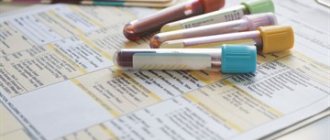The level of glucose in the blood during pregnancy will provide accurate information about the condition of the pregnant woman, and can prevent pathological processes in the intrauterine development of the baby. This carbohydrate is a source of energy necessary for a number of chemical and biochemical processes in the human body.
When glucose is broken down in the blood during pregnancy, the expectant mother receives full energy and nutrition, while not only her cells are saturated, but also the cells of the developing fetus. And any deviation from normal indicators helps to promptly identify the onset of the pathological process, preventing further complications.
As a rule, the doctor recommends taking a sugar test if close relatives have a history of diabetes, the woman is overweight, has previously had a miscarriage, has an infectious inflammation in the urethra, and also during pregnancy after 35 years of age.
It is necessary to consider how to take the test correctly, what is the normal blood sugar level during pregnancy? In addition, it is important to find out how high blood glucose levels affect the course of pregnancy?
The role of glucose during pregnancy
Sugar (in common parlance) or glucose is the most powerful source of carbohydrates for the body.
These elements are responsible for feeding the energy of the whole organism. If there are not enough of them, the most minor health problem will be drowsiness or constant fatigue. They will lead to mild mental disorders against a background of increased stress.
That is, this microelement must be present in the blood system in fairly large quantities, since it is absolutely irreplaceable.
When conceiving, there is a need to spend more effort, because some mothers prefer to maintain their previous lifestyle. And this does not take into account the fact that feeding the baby also takes a lot of effort.
The main problems begin not because of glucose, but because of a lack of a special thyroid hormone called insulin, which is responsible for converting it directly into energy.
The remaining substances are excreted naturally, but excess in the urine may indicate the first stage of diabetes, or problems with the renal system.
In any case, it is necessary to carry out a number of additional examinations to ensure your health.
Blood sugar test
Let's consider the most common analysis, which is included in the compulsory medical insurance program and is prescribed to all pregnant women at the time of registration.
How to prepare for the test:
- Fast for at least 8 hours, but no more than 14 hours.
- Do not eat fatty foods the day before the test.
- Do not smoke 2–3 hours before blood sampling and do not drink alcoholic beverages for two days.
- You can drink regular drinking water.
- Take easily digestible carbohydrate foods with you, for example, banana, drinking yogurt.
- Warn the nurse if you violated the preparation rules or if you do not tolerate blood sampling well.
A midwife or treatment room nurse will tell you how to take the test.
The procedure lasts several minutes, the nurse takes blood from a vein into several small tubes (for biochemical analysis) or into one if glucose is given separately. After the procedure, you need to sit in the corridor for 15 minutes until the bleeding from the puncture site stops. During this time, you can eat the food you brought with you.
Why is diagnostics necessary?
There are many causes and symptoms of sugar in the urine during pregnancy; there are three categories:
- Norm.
- Minor deviation.
- Violations.
At the same time, there is a certain probability that the disease will progress over time. During pregnancy, this percentage increases significantly due to the constant increased load.
To avoid the development of pathologies in the woman and the embryo, care must be taken to ensure that the disease is detected before negative reactions from the body begin. This could be a simple rash or even a failure of the entire system (very often the urinary system).
At the same time, many useful minerals that are necessary for the normal development of the future person will be removed from the body.
How will sugar affect the baby during pregnancy? It is worth remembering that it is necessary, but in very limited quantities.
If there is an excess, it is possible to develop:
- Hypoxia or oxygen starvation, which results in a high chance of premature birth or stillbirth. If this happens in the first or second trimester, then there is no point in counting on a living baby.
- Psychological illnesses due to problems with the central nervous system. It is not fully formed, so any significant deviation from the norm can seriously damage its function.
- Congenital diabetes in the baby, which will lead to the need to follow doctors’ orders throughout life, fight excess weight and follow some diets that prohibit the use of sweets.
How to take a glucose test during pregnancy? For a successful and correct procedure, it is necessary to follow certain rules so that the result indicated in the certificate is reliable.
There are often situations where repeat tests are required due to incorrect numbers that are caused by non-compliance with special instructions.
- It is necessary to collect urine during the day in a special clean container, which can be freely purchased at the nearest pharmacy.
- Before the procedure, you should take care of the hygiene of the urinary organ to avoid high levels of acidity or other indicators, which can be quite dependent on such factors.
- During the collection period, you should not use cosmetics and detergents, as they will not affect the result, but can lead to the development of infections and problems with vaginal dryness.
- The day before the test, you must follow a special diet that excludes sweets, alcohol and nicotine. However, it is not advisable to use the last two products throughout pregnancy.
- If deviations are detected that are not caused by a violation of the above points, there will be a need to regularly take tests for urine and blood sugar during pregnancy.
At the same time, during clinical studies it was found that the lack of a healthy lifestyle can also affect the final result.
This does not mean that grueling training is necessary, but daily exercise is recommended.
Exercising improves metabolism.
Preparing for the study
It is not recommended to go through the sugar curve without prior preparation. The influence of any factor affecting glycemia leads to an unreliable result.
To avoid such an error, you should go through several stages of preparation:
- For 3 days before testing, do not change your food preferences, continuing to maintain your usual lifestyle.
- Do not use any medications (only after prior agreement with your doctor) so as not to artificially distort the data.
- During the examination, you should be in a calm state and not tense.
- The last meal should be taken 10 or 14 hours before donating blood.
Rules for diluting glucose:
- the solution should be prepared only before the study;
- To dilute glucose, you need to use clean still water;
- the concentration of the solution should be determined by a doctor;
- At the request of the pregnant woman, a small amount of lemon juice is added to the liquid.
The amount of glucose required for analysis depends on the time it is carried out:
- 1 hour – 50 g;
- 2 hours – 75 g;
- 3 hours – 100 g.
Reasons for the increase:
- eating on the eve of testing;
- emotional stress;
- physical fatigue;
- pathologies of the thyroid gland;
- taking medications (diuretics, adrenaline and others).
Reasons for lower results:
- long-term fasting (over 14 hours);
- diseases of the liver and other digestive organs;
- tumors;
- obesity;
- poisoning
For the expectant mother, obtaining the correct results of any analysis is a paramount task, since the successful course of pregnancy and the health of the baby depend on them. Timely detection of the disease allows for faster determination of therapeutic methods and observations.
How to get tested during pregnancy
There are certain procedures that must be followed.
There is little monitoring of pregnant women to ensure a healthy birth without surgery. It is imperative to take a general blood test and, if necessary, supplement it with a biochemical test. The same applies to human waste products.
If, as a result, significant deviations from the norm were discovered, then the study is first carried out again, and only after making sure of a truly existing diagnosis does the period of treatment and rehabilitation begin.
This is necessary to reduce the risk during the development of the embryonic system, because it can cause:
- Carrying out a cesarean section due to the large size of the fetus. In this case, there will be a need for constant ultrasound examinations to note changes in weight.
- Hyperglycemia (increased glucose levels) causes congenital pathologies and mental problems.
- In some cases, the child may not receive enough insulin, then the sugar in his not yet formed body will not be processed, which can lead to death.
Interpretation of results
The resulting blood test is first assessed by a gynecologist, who, if necessary, refers the pregnant woman for a consultation with an endocrinologist. The reason for contacting another specialist should be a deviation of glucose from the permissible values.
The rate of the indicator may differ slightly depending on the medical laboratory conducting the study. The interpretation of the result is made taking into account the condition of the body, the patient’s weight, his lifestyle, age and concomitant diseases.
The standard of analysis performed in pregnant women has been slightly changed. If the results of the initial test exceed the permissible values, the doctor will prescribe a repeat test.
Normal indicator table:
| Testing period | Value, mmol/l |
| On an empty stomach | No more than 5.4 |
| In an hour/half an hour | No more than 10 |
| In 2 hours | No more than 8.6 |
During pregnancy, it is important to exclude a sharp rise in glycemia, therefore, after the first blood draw, the glucose concentration is analyzed. If the level of sugar measured on an empty stomach exceeds the norm, then the test is stopped at this stage.
Detection of increased glycemia requires appropriate measures:
- dietary adjustments to avoid excessive consumption of carbohydrates;
- the use of certain physical activities;
- constant medical supervision (inpatient or outpatient);
- use of insulin therapy (as prescribed by a doctor);
- Regular monitoring of glycemia by measuring it with a glucometer.
Hormone injections are prescribed to a pregnant woman only if the diet is ineffective and the glycemic level remains elevated. The selection of insulin dosage should be carried out in a hospital setting. Most often, pregnant women are prescribed long-acting insulin in an amount equal to several units per day.
Properly selected treatment can minimize harm to the baby. However, detection of elevated glycemic levels in a pregnant woman makes adjustments during pregnancy. For example, delivery usually occurs at 38 weeks.
Diabetes is no longer a rare disease, so pregnant women may also be at risk of developing it. Most often, the manifestation of the disease is expressed in a gestational form, the distinctive feature of which is considered to be the appearance during gestation and self-elimination after childbirth.
Video material about gestational diabetes in pregnant women:
In rare cases, the pathology remains in a woman, but such situations are not excluded. 6 weeks after the baby is born, blood tests to determine blood sugar levels should be repeated. Based on their results, it can be concluded whether the disease is progressing or its manifestations have disappeared.
Glucose standards
There is a table of urine glucose levels during pregnancy, but this information can be expressed much more simply:
- The amount of sugar is less than 1.6 moles per liter. Absolute norm.
- Indicators range from 1.7 to 2.7 mol per liter. The concentration is acceptable, but the attention of doctors is significantly increased.
- More than 2.8 moles per liter indicates serious health problems that need to be gotten rid of quickly.
Sugar levels are low
In most cases, this is a good indicator, but if there is no sugar at all, it is necessary to conduct a full biochemical study of blood cells.
With very low numbers, there is a possibility of carbohydrate deficiency.
This will lead to:
- rapid exhaustion;
- drowsiness;
- high blood pressure;
- frequent headaches;
- digestive problems.
Glucose is increased
The most common symptom of diabetes.
If there is too much sugar in the urine released, then the body is not able to process it. This indicates a lack of the insulin enzyme, which is responsible for this function.
This may indicate:
- problems with the endocrine system;
- renal failure;
- diabetes mellitus;
- traumatic brain injury due to which metabolism was impaired;
- inflammation of the pancreas.
Symptoms
To detect the disease in the early stages, there is a list of manifestations characteristic of gestational diabetes.
So, during pregnancy, a woman, even in the early stages, will present the following complaints:
- weakness;
- dry mouth;
- constant thirst;
- frequent urination;
- skin itching;
- headache.
The sensations directly depend on the level of sugar in the blood. The long course of the disease may be complicated by other conditions, which leads to a change in the clinical picture. Severe cases may be accompanied by loss of consciousness.
If in doubt, it is better to consult a doctor
Contraindications to the GTT test during pregnancy
There are a number of points, if at least one of them is present, the procedure will be somewhat complicated due to the impossibility of conducting additional analysis. They are:
- Intolerance to this chemical element.
- Chronic pancreatitis.
- Toxicosis, which is accompanied by nausea, confusion and weakness.
- Consequences of surgical intervention.
- Acute respiratory disease.
- Infection or severe inflammation of internal organs.
List of contraindications
GTT is not performed in case of severe toxicosis.
In some cases, the test is strictly contraindicated:
- severe toxicosis in the first trimester of pregnancy;
- gastrointestinal diseases;
- previous abdominal surgeries;
- infectious and inflammatory processes;
- Crohn's disease;
- late stages of pregnancy.
If the above problems are present, an oral glucose tolerance test is not performed. There is a need to determine another diagnostic method.
Control test
Since urine changes throughout the day, and sometimes this period is even slightly shorter, there is a fairly high probability of misdiagnosis. Therefore, if there is suspicion, measures are not taken immediately, but only after a control test, which includes:
- general blood analysis;
- biochemistry;
- glucose sensitivity test;
- Analysis of urine;
- in some cases an ultrasound is performed.
Prevention and treatment of sugar in urine during pregnancy should be timely, effective and under the supervision of a specialist.
Indications for analysis
During pregnancy, it is important for women to undergo all examinations prescribed by a doctor, since not only their own health, but also that of the unborn baby depends on the processes occurring in the body. The sugar curve is considered one of the mandatory tests. It is important for patients to know why they should take it and in what cases testing is prescribed.
There are several indications for analysis:
- abnormalities in urine test results;
- high blood pressure values;
- weight gain;
- suspicion of developing diabetes;
- polycystic ovary syndrome;
- predisposition to diabetes, inherited;
- development of the gestational form of the disease in a previous pregnancy;
- birth of overweight children;
- maintaining a sedentary lifestyle (as prescribed by a doctor).
The number of such tests prescribed during pregnancy is determined by the doctor. In some cases, it is necessary to donate blood again if the results of a previous test are questionable.
A stress blood test can not be performed on all women, but only on those for whom it is not contraindicated.
List of restrictions:
- cases when the concentration of glucose tested on an empty stomach exceeds 7 mmol/l;
- the patient's age is less than 14 years;
- third trimester of pregnancy;
- inflammatory processes occurring in the body;
- infections;
- pancreatitis (during exacerbation);
- taking certain pharmacological drugs that increase glycemia;
- malignant tumors;
- toxicosis (the test increases attacks of nausea).
A favorable period for performing the analysis is considered to be between 24 and 28 weeks of pregnancy. If the expectant mother has already encountered a similar pathology in previous periods of pregnancy, then testing is recommended earlier (16-18 weeks). The analysis is performed from 28 to 32 weeks in exceptional situations; in a later period, the study is not indicated.
Recommended test deadlines and preparation rules
The first stage of analysis for latent diabetes is carried out between 16 and 18 weeks of pregnancy. In some cases, the study is scheduled up to 24 weeks.
If during the biochemical test an increased amount of sugar is observed, then the test is scheduled at week 12.
The second stage of the examination falls on the period from 24 to 26 weeks. The presence of a high concentration of sugar at this stage can harm not only the mother, but also the child. To pass the glucose tolerance test, proper preparation is important.
The following recommendations should be observed:
- three days before the test, you need to provide a daily menu of 150 grams of carbohydrates;
- the last meal should contain at least 50 grams of carbohydrates;
- 8 hours before the test you should not eat food;
- do not take dietary supplements or vitamins containing sugar before taking the test;
- progesterone can influence incorrect test results, so you should first discuss your dosage regimen with your doctor;
- You must be in a sitting position during the entire testing process.
In the early stages of fetal development, this test is not informative, since insulin resistance appears only in the second trimester.
Criteria for diagnosing “latent diabetes”
The criterion for making a diagnosis of diabetes mellitus is a fasting glucose level of more than 5.1 mmol/l.
If its level in the blood before eating food is higher than this indicator, then the woman has a metabolic disorder.
During the second test an hour later, in case of diabetes mellitus, the values will vary from 10 to 11 mmol/l.
After the third blood donation, carried out two hours after taking the solution, indicators from 8.5 to 11 mmol/l or more are relevant for determining diabetes.
If diagnosed, immediate treatment should be carried out, as the likelihood of an unfavorable pregnancy outcome increases.
What to do after childbirth
There are the following stages that every woman who has had GDM during pregnancy goes through:
- Determination of blood sugar levels 2 months after birth. If carbohydrate metabolism is disturbed, consultation with an endocrinologist is recommended.
- If the analysis shows normal values, you should be examined every few years in the future. This is necessary because women who have had GDM have an increased risk of developing type 2 diabetes.
- Use of contraceptive methods in the next 2 years after childbirth.
Expert recommendations indicate the need to carefully plan each subsequent pregnancy. It is better to use COCs or IUDs as contraceptives.
Important:
- keep in good shape;
- do not exceed the body mass index;
- eliminate bad habits;
- follow a diet rich in vitamins and minerals.
Following these simple rules can reduce the risk of GDM during the next birth. Completing routine examination methods makes it possible to identify the disease in the early stages of formation.
Must be taken at 24 and 28 weeks











